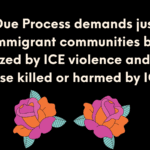Image from #HereforJaneTX
When you first start trying to get an abortion in Texas, it can seem like all the cards are stacked against you. First, there are so few clinics that it can take a week or longer to get an ultrasound appointment. And why do you even need an ultrasound appointment in the first place, when you already got one from another place? Second, why is the abortion pill just as expensive as the abortion procedure? Why can’t you use your Medicaid or your college student insurance? Why can’t you just get the abortion pill over the counter – it’s safe, isn’t it?
The answer to all these questions is: yes, abortion is safe, but abortion has also been the focus of targeted, restrictive laws that make it harder to access and more expensive.
Before 1973, abortion was actually illegal. But judges had started to protect reproductive rights, like access to birth control, by saying that the 14th Amendment – the one about due process – protected a right to privacy. When to have a child is a private and intimate decision that the court thought belonged to women, not the government. In 1965, the Supreme Court said that married couples had a right to make that private decision by using birth control, in a case called Griswold v. Connecticut. In 1973’s landmark Roe v. Wade decision, the Court ruled that the right to privacy went further—protecting the right to abortion until the point of fetal viability (when the baby can survive outside the womb – around 24 weeks of gestation). With this decision, abortion became a constitutional right in the United States—and it still is today.
But ever since this right was established, states—and the federal government—have been working to make it harder to exercise. In 1976, Congress passed the Hyde Amendment, which bars the use of federal funds for abortion, except in cases of incest, rape, or life endangerment. Texas has a unique—and tragic—connection to the Hyde Amendment: the year after it was passed, a Texas woman named Rosie Jimenez died from complications from an illegal abortion she’d sought after Medicaid would not cover a legal one.
As abortion became safer and more accessible, politicians who are against abortion had to come up with ways to make abortion more expensive and more invasive. Texas’s methods have been especially creative, and have also generated some important turning points in judicial history.
In 1977, Texas passed a law declaring that hospitals could decline to provide abortion for any reason. In 1985, the state passed a law declaring that only state-licensed physician can provide abortion care. This makes abortion more expensive, since clinics must find and pay doctors even though nurse practitioners are totally qualified to perform aspiration abortions and D&Cs, or evaluate someone for medical abortion. In 1999, the state passed a law stating that a woman under 18 cannot get an abortion until 48 hours after her physician tells her parents. If a teen thought her parents would be abusive if they found out, she had to get permission from a judge to get the abortion without notifying them. In response, Jane’s Due Process was founded to help minors who needed to navigate the judicial bypass process.
After 2003, restrictions accelerated rapidly. In that year alone, Texas passed laws requiring that women undergo a 24-hour waiting period before an abortion; that women be given a list of counseling resources, including anti-abortion centers called crisis pregnancy centers; that all abortions after 16 weeks of pregnancy be performed in a licensed hospital or ambulatory surgical center; and that women be given state-produced, and medically inaccurate, materials about abortion. Yes, you read that right: the state requires doctors to give women misleading information, including a conclusively-debunked link between abortion and breast cancer. Even worse: minors seeking judicial bypass can be asked questions about these materials by a judge, and if they aren’t well-informed about the state’s materials, their bypass can be denied.
In 2005, the state began funding those crisis pregnancy centers, which are usually explicitly religious—meaning your tax dollars are going not just disseminating, but actively supporting the production of, inaccurate medical information. (On a similar note, a 2011 bill sponsored a “Choose Life” state license plate program funding those same centers.) In 2006, the state passed a law requiring that women under 18 seeking abortion must have parental consent, a step beyond parental notification. In 2011, the state required women to undergo mandatory—and again, medically unnecessary—sonograms, and further requires doctors to verbally describe the contents of the images.
2013 was a major year for abortion limitations in Texas, including banning abortions after 20 weeks and extra restrictions on the use of the “abortion pill.” Most notably, Texas passed laws requiring that abortion providers meet the standards of ambulatory surgical centers and that the doctors performing them have access to admitting privileges at a nearby hospital—laws that would have had the effect of closing the majority of abortion clinics in the state. Advocates—and lawyers—argued that these restrictions were unconstitutional, and in 2016, the Supreme Court agreed—ruling that such restrictions placed an “undue burden” on women seeking abortion. Undeterred, in 2015 the state made judicial bypass—the process by which teens without parental consent obtain permission from the courts—even more prohibitive. The Trust Respect Access Coalition has compiled a complete timeline of Texas-specific restrictions—it makes for pretty grim reading.
What is the purpose of all of these restrictions? To make it harder to access abortion, yes. But as Margaret Talbot argues in a recent New Yorker article—in which Jane’s Due Process has a cameo!—this is only part of the rationale. States may not be able to make abortion illegal, but they can make it feel illegal. It’s important to remember that you have a constitutional right to abortion—no matter how the state wants you to feel about exercising that right, or how difficult they may try to make it to do so.




